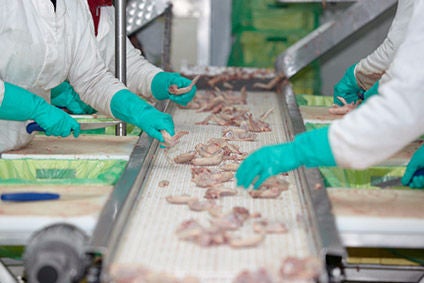
Food and drink manufacturers operating in the UK may find it difficult to fill seasonal vacancies this Christmas, the organisation that represents labour providers in the country has warned.
The UK food manufacturing sector employs 117,000 non-UK EU workers, benefiting from the free movement of labour between EU member states. Since the UK’s vote to leave the EU on 23 June, manufacturers have expressed concerns about how Brexit could affect the supply of labour from across the English Channel.

Discover B2B Marketing That Performs
Combine business intelligence and editorial excellence to reach engaged professionals across 36 leading media platforms.
The consequence of Brexit on the flow of labour from the EU could become clear once the UK and Brussels have completed negotiations on the country leaving the bloc. Two years of talks are set to begin when the UK triggers Article 50, which the UK government has indicated could happen next March. However, the free movement of labour is likely to be a central point of any trade negotiations between the UK and the EU and those talks may not start until the UK is formally outside the bloc, which looks to be in April 2019 at the earliest.
David Camp, the chief executive of the Association of Labour Providers, said the UK’s vote in June to leave the EU was already having an impact on the supply of seasonal labour into the food sector, a significant proportion of which is from overseas nationals.
Speaking at a conference in London yesterday on the impact Brexit could have on the industry, Camp said he was “really concerned” manufacturers would not be able to find the seasonal staff for the festive period.
Camp said there are factors unrelated to the referendum result that are having an impact on the supply of seasonal labour. However, he insisted the impact of Brexit was already being felt, including the consequences of the fall in sterling and a rise in race hate against migrant workers.

US Tariffs are shifting - will you react or anticipate?
Don’t let policy changes catch you off guard. Stay proactive with real-time data and expert analysis.
By GlobalData“At this moment in time, labour providers are experiencing the worst labour shortage since before 2004. One of our largest members has just analysed their response to advertising and it is at 52% of the same period last year. Other ALP members are reporting reductions of between 30% and 70%. There are many reasons for that. We have record-breaking employment statistics at the moment, there is a huge availability of vacancies, there are vacancies in easier work, better-paying work, in permanent work over temporary work,” Camp told the conference, which was convened by UK trade association the Food and Drink Federation.
“There are also the issues that have been created by the referendum decision. The reduction in the value of the pound means the exchange value of your wages back into your home currency is worth 15% less than it was. That absolutely wipes out the increase in the National Living Wage. There is the anti-migrant sentiment. Things do get built up in the media but my members were reporting back they were seeing actual cases of race hate and anti-migrant sentiment.”
According to Camp, the ALP’s members provide 70% of the agency labour into the UK food manufacturing and farming sector. Around 90-95% of those are EU workers, he said.
Camp said: “In the short term the quality of workers being able to be supplied has dropped. Language levels have dropped. The cost of sourcing those workers has increased, which goes on top of the increases in the National Living Wage, on top of the increases which are coming into the Apprenticeship Levy. I’m not a sensationalist. This is the first time in all of the years I’ve been in that I’m really concerned that we’re not going to meet the labour supply that we require for the Christmas peak.”





